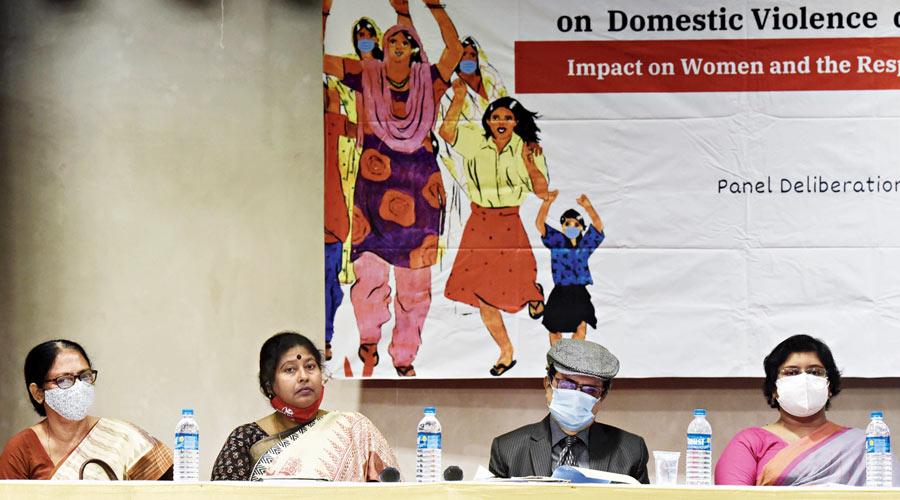A group of women, survivors of domestic violence, on Wednesday recounted in front of a panel how their horrors were multiplied during the pandemic.
The four-member panel at Rotary Sadan in Chowringhee in the central business district included a retired judge of Calcutta High Court and a former chairperson of the state women’s commission.
The panel heard how the prolonged inaccessibility of redress mechanisms — from police to courts — because of the pandemic aggravated the trauma of the survivors.
The testimonies were part of a ‘public hearing’ on domestic violence during Covid, organised to understand “it’s impact on women and the response of state agencies”.
A mother of two — a 10-year-old son and 19-year-old daughter — was one of the survivors. The woman has allegedly been facing domestic violence for “close to two decades now”. “My daughter gets beaten up if she protests,” the woman said, breaking down multiple times during the testimony.
Until last Durga Puja, she lived with her husband, an auto driver, in Baruipur on the southern fringes of Kolkata. But on Saptami, her husband allegedly hit her so hard that she started bleeding from the head. She was taken to hospital and returned to her parents’ home in Ballygunge in south Kolkata.
“I am the co-owner of the house we lived in. My husband wants to oust me from that house and has threatened to kill me if I stake claim to the house,” she said.
She alleged that several complaints to local police elicited no response.
“You are extremely brave. Don’t give up hope after coming this far,” Justice Samaresh Banerjea, who headed the panel, told the woman.
Multiple women and the rights activists working for them said the transport curbs during the pandemic stalled legal recourse. A woman from Bhowanipore in south Kolkata, also an alleged survivor of domestic abuse in the hands of her husband and in-laws, is yet to get a hearing in a maintenance case she filed last year.
The police, heavily burdened with Covid relief work last year, were unable to take up many domestic violence cases seriously, alleged the activists.
After the testimonies, mental health experts, lawyers and rights activists shared their experiences of handling cases of domestic violence during the pandemic.
“With the perpetrator and the victim spending much more time in home confinement, the scope of conflict expanded manifold,” said psychotherapist Chandana Bakshi.
“Children were the worst affected,” she said, sharing the example of a four-and-a-half-year old boy who tried to commit suicide. “He had gone running to his father, a factory worker, who came home drunk after a shift. The father rebuffed the boy, throwing him away.”
The public hearing was organised by AMAN, an “international network to end domestic violence” that started in 2006. Now, it has over 150 organisations in its fold.
“We believe that it is essential that the competent authorities and the associations in charge of creating/ensuring access to justice for those facing violence become more aware of the impact of domestic violence on women and children during Covid and thereby become more proactive and vigilant to ensure women's access to justice,” said a concept note.
“Armed with the experiences and the recommendations from the eminent panel, on behalf of AMAN, Bengal Chapter, we shall prepare a document and present it to the Honourable Chief Justice, Calcutta High Court for bringing the issue to his notice and motivate a response,” an organiser said.
The panel, also including Sunanda Mukherjee, former chairperson of the Bengal Women’s Commission, Anwesha Banerjee, a journalist, and Rahima Khatun, a rights activist, came up with a set of interim recommendations at the end of the hearing. Some of them are
- Any complaint regarding domestic violence against women has to be considered as an emergency by the police.
- More helplines of trained mental health professionals for survivors of violence, their children and other affected members of their family need to be instituted during emergencies.
- Using public mode of broadcast and telecast to spread awareness on mental health and disseminate information about services available during emergencies such as a pandemic. Content needs to focus on identifying warning signals to potential mental illness, self-care and parenting.
